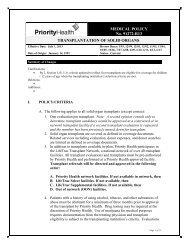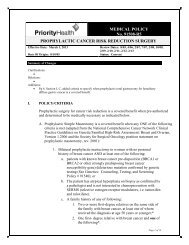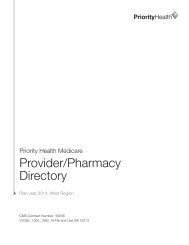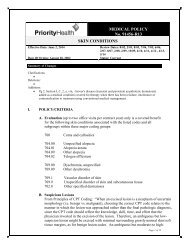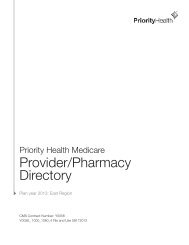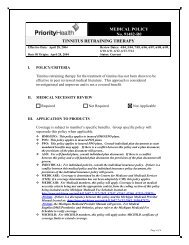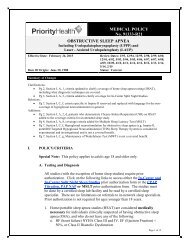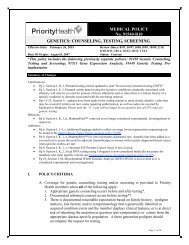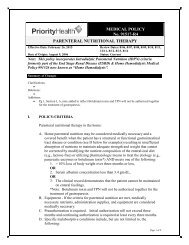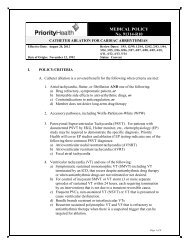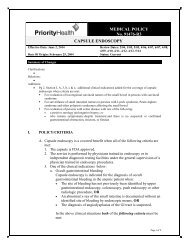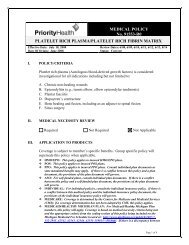Pharmacogenomic Testing - Priority Health
Pharmacogenomic Testing - Priority Health
Pharmacogenomic Testing - Priority Health
Create successful ePaper yourself
Turn your PDF publications into a flip-book with our unique Google optimized e-Paper software.
Summary of Changes<br />
MEDICAL POLICY<br />
No. 91570-R5<br />
PHARMACOGENOMIC TESTING<br />
Effective Date: February 26, 2015 Review Dates: 2/10, 2/11, 2/12, 2/13, 2/14, 2/15<br />
Date Of Origin: February 10, 2010<br />
Status: Current<br />
Clarifications:<br />
• Pg 1, Section I, language updated to clarify the criteria that must be met for pharmacogenetic<br />
testing to be considered medically necessary.<br />
• Pg 1, Section I, A, polymorphisms added to section heading.<br />
• Pg 2, Section I, A, Genotyping for other Cytochrome P450 polymorphisms language updated to<br />
include beta blockers.<br />
• Pg 5, Section IV, descriptive information formerly in Section I, A, moved to the description<br />
section of the policy.<br />
Deletions:<br />
•<br />
Additions:<br />
• Pg 2, Section I, A, CYP2D6 genotyping is considered to be experimental and investigational for<br />
identifying individuals with Alzheimer's disease with different clinical response to donepezil<br />
(Aricept) because its clinical value has not been established.<br />
• Pg 4, Section I, K, Genetic testing that is specified as a requirement for drug treatment per the<br />
FDA is considered medically necessary.<br />
• Pg 13, Appendix I, Non-Covered <strong>Testing</strong> list updated to include SuperGene (STAR), Millennium<br />
PGT and PersonaGene Genetic Panels.<br />
I. POLICY/CRITERIA<br />
In general pharmacogenetic testing (e. g., genotyping, mutation analysis) is only<br />
considered to be medically necessary when the following criteria is met (this list<br />
may not be all inclusive):<br />
• The individual is a candidate for a targeted drug therapy associated with a<br />
specific gene biomarker or gene mutation.<br />
• The results of the pharmacogenetic test will directly impact clinical<br />
decision-making AND clinical outcome for the individual.<br />
• The testing method is considered to be scientifically valid to identify the<br />
specific gene biomarker or gene mutation.<br />
• The testing method has been scientifically proven to show a relationship<br />
between a specific gene biomarker or gene mutation and a specific<br />
therapeutic drug target.<br />
Page 1 of 13
MEDICAL POLICY<br />
No. 91570-R5<br />
<strong>Pharmacogenomic</strong> <strong>Testing</strong><br />
A. Cytochrome P450 (CYP450) polymorphisms<br />
• Genotype testing for identification of the CYP2C19 variant of<br />
Cytochrome P450 to determine the drug-metabolizer status of individuals:<br />
a) who are currently undergoing treatment with clopidogrel and have not<br />
been tested, or b) for whom the use of clopidogrel is being proposed, is<br />
considered medically necessary. Repeat CYP2C19 genotyping has no<br />
proven value.<br />
• Genotyping for CYP2D6 polymorphisms is medically necessary for<br />
persons who have been prescribed doses of tetrabenazine (Xenazine)<br />
greater than 50 mg per day. Repeat CYP2D6 genotyping has no proven<br />
value.<br />
• Genotyping for other Cytochrome P450 polymorphisms (including those<br />
associated with warfarin, tamoxifen, proton pump inhibitors, beta blockers<br />
and selective serotonin reuptake inhibitors (anti-psychotropics) is<br />
considered to be experimental and investigational because the clinical<br />
value of this type of genetic testing has not been established<br />
• CYP2D6 genotyping is considered to be experimental and<br />
investigational for identifying individuals with Alzheimer's disease with<br />
different clinical response to donepezil (Aricept) because its clinical value<br />
has not been established.<br />
B. Thiopurine S-methyltransferase (TPMT) genetic polymorphism<br />
1. TPMT gene mutation assays (e.g., PRO-Predict R TPMT) or TPMT<br />
phenotypic assays (Thiopurine metabolite testing, TPMT enzymatic<br />
activity, e.g., PRO-Predict R EnzAct) medically necessary prior to initiation<br />
of 6-mercaptopurine or azathioprine therapy. Only one genotypic or<br />
phenotypic assay of TPMT activity is necessary per member per lifetime.<br />
2. TPMT gene mutation assays and TPMT phenotypic assays are considered<br />
experimental and investigational for all other indications.<br />
C. HLA-B*1502<br />
Genotyping for HLA-B*1502 is considered to be medically necessary for<br />
persons of Asian ancestry before commencing treatment with carbamazepine<br />
(Tegretol). B*1502, an HLA allele is strongly associated with carbamazepineinduced<br />
Stevens-Johnson syndrome/toxic epidermal necrolysis in south-east<br />
Asians.<br />
Page 2 of 13
MEDICAL POLICY<br />
No. 91570-R5<br />
<strong>Pharmacogenomic</strong> <strong>Testing</strong><br />
D. HLA-B*5701 for Abacavir hypersensitivity<br />
HLA-B*5701 screening is considered to be medically necessary for persons<br />
infected with HIV-1 before commencing treatment with abacavir (Ziagen).<br />
E. KRAS Mutation Assay<br />
<strong>Testing</strong> is considered to be medically necessary ONLY prior to initiation of<br />
epidermal growth factor receptor (EGFR) inhibitor therapies cetuximab<br />
(Erbitux®) and panitumumab (Vectibix®) for the treatment of metastatic<br />
colorectal cancer.<br />
F. CFTR G551D Mutation Analysis<br />
<strong>Testing</strong> to detect the G551D mutation in the CTFR gene is considered to be<br />
medically necessary for persons with cystic fibrosis who are being considered<br />
for treatment with ivacaftor (Kalydeco).<br />
G. EGFR Mutation Analysis<br />
<strong>Testing</strong> for the presence of a characteristic mutation in the epidermal growth<br />
factor receptor (EGFR) is considered to be medically necessary to determine a<br />
subset of patients with non-small cell lung cancer (NSCLC) who are likely to<br />
have a favorable response to EGFR tyrosine kinase inhibitors (TKIs).<br />
H. BRAF V600E or V600K<br />
BRAF V600E or V600K mutation testing is considered medically necessary<br />
for persons who are considering vemurafenib (Zelboraf) for the treatment of<br />
unresectable or metastatic melanoma<br />
I. Anaplastic lymphoma kinase (ALK) fusion gene<br />
ALK testing is considered medically necessary for persons who are<br />
considering crizotinib (Xalkori) for the treatment of non-small cell lung<br />
cancer (NSCLC).<br />
J. MGMT (O(6)-methylguanine-DNA methyltransferase)<br />
MGMT gene methylation assay is considered medically necessary for<br />
predicting response to temozolomide (Temodar) in persons with glioblastoma.<br />
Page 3 of 13
MEDICAL POLICY<br />
No. 91570-R5<br />
<strong>Pharmacogenomic</strong> <strong>Testing</strong><br />
K. Genetic testing for FDA approved drug treatments<br />
Genetic testing that is specified as a requirement for drug treatment per the<br />
FDA is considered medically necessary.<br />
II.<br />
MEDICAL NECESSITY REVIEW<br />
Selected tests require prior authorization. Refer to Section V, Coding<br />
Information, for specific prior authorization requirements for testing by CPT<br />
code.<br />
All tests performed at non-participating laboratories will require prior<br />
authorization for all products.<br />
III.<br />
APPLICATION TO PRODUCTS<br />
Coverage is subject to member’s specific benefits. Group specific policy will<br />
supersede this policy when applicable.<br />
HMO/EPO: This policy applies to insured HMO/EPO plans.<br />
POS: This policy applies to insured POS plans.<br />
PPO: This policy applies to insured PPO plans. Consult individual plan documents as<br />
state mandated benefits may apply. If there is a conflict between this policy and a plan<br />
document, the provisions of the plan document will govern.<br />
ASO: For self-funded plans, consult individual plan documents. If there is a conflict<br />
between this policy and a self-funded plan document, the provisions of the plan document<br />
will govern.<br />
INDIVIDUAL: For individual policies, consult the individual insurance policy. If there is<br />
a conflict between this medical policy and the individual insurance policy document, the<br />
provisions of the individual insurance policy will govern.<br />
MEDICARE: Coverage is determined by the Centers for Medicare and Medicaid Services<br />
(CMS); if a coverage determination has not been adopted by CMS, this policy applies.<br />
MEDICAID/HEALTHY MICHIGAN PLAN: For Medicaid/<strong>Health</strong>y Michigan Plan<br />
members, this policy will apply. Coverage is based on medical necessity criteria being met<br />
and the appropriate code(s) from the coding section of this policy being included on the<br />
Michigan Medicaid Fee Schedule located at: http://www.michigan.gov/mdch/0,1607,7-<br />
132-2945_42542_42543_42546_42551-159815--,00.html. If there is a discrepancy between<br />
this policy and the Michigan Medicaid Provider Manual located at:<br />
http://www.michigan.gov/mdch/0,1607,7-132-2945_5100-87572--,00.html, the Michigan<br />
Medicaid Provider Manual will govern. For Medical Supplies/DME/Prosthetics and<br />
Orthotics, please refer to the Michigan Medicaid Fee Schedule to verify coverage.<br />
MICHILD: For MICHILD members, this policy will apply unless MICHILD certificate of<br />
coverage limits or extends coverage.<br />
Page 4 of 13
MEDICAL POLICY<br />
No. 91570-R5<br />
<strong>Pharmacogenomic</strong> <strong>Testing</strong><br />
IV.<br />
DESCRIPTION<br />
The CYP450 test was developed as a clinical test to evaluate an individual's<br />
metabolic capacity for certain drugs by identifying polymorphisms of 2 CYP450<br />
enzymes CYP2D6 and CYP2D19). Pharmacogenetic factors operate at<br />
pharmacokinetic as well as pharmacodynamic levels- the two components of the<br />
dose-response curve of a drug. Polymorphisms in drug metabolizing enzymes,<br />
transporters and/or pharmacological targets of drugs may profoundly influence<br />
the dose-response relationship between individuals<br />
<strong>Pharmacogenomic</strong>s is a science that examines the inherited variations in genes<br />
that dictate drug response and explores the ways these variations can be used to<br />
predict whether a patient will have a good response to a drug, a bad response to a<br />
drug, or no response at all. The term comes from the words pharmacology and<br />
genomics and is thus the intersection of pharmaceuticals and genetics.<br />
V. CODING INFORMATION<br />
ICD-9 Codes that may support medical necessity<br />
See criteria<br />
CPT/HCPCS Codes<br />
May be covered if criteria is met<br />
* Prior Authorization required<br />
81210* BRAF (v-raf murine sarcoma viral oncogene homolog B1) (eg, colon cancer),<br />
gene analysis, V600E variant<br />
81221 CFTR (cystic fibrosis transmembrane conductance regulator) (eg, cystic<br />
fibrosis) gene analysis; known familial variants<br />
81225 CYP2C19 (cytochrome P450, family 2, subfamily C, polypeptide 19) (eg, drug<br />
metabolism), gene analysis, common variants (eg, *2, *3, *4, *8, *17)<br />
81226 CYP2D6 (cytochrome P450, family 2, subfamily D, polypeptide 6) (eg, drug<br />
metabolism), gene analysis, common variants (eg, *2, *3, *4, *5, *6, *9, *10,<br />
*17, *19, *29, *35, *41, *1XN, *2XN, *4XN)<br />
81227 CYP2C9 (cytochrome P450, family 2, subfamily C, polypeptide 9) (eg, drug<br />
metabolism), gene analysis, common variants (eg, *2, *3, *5, *6)<br />
81235* EGFR (epidermal growth factor receptor) (eg, non-small cell lung cancer) gene<br />
analysis, common variants (eg, exon 19 LREA deletion, L858R, T790M,<br />
G719A, G719S, L861Q)<br />
81275 KRAS (v-Ki-ras2 Kirsten rat sarcoma viral oncogene) (eg, carcinoma) gene<br />
analysis, variants in codons 12 and 13<br />
81287 MGMT (O-6-methylguanine-DNA methyltransferase) (eg, glioblastoma<br />
multiforme), methylation analysis<br />
Page 5 of 13
MEDICAL POLICY<br />
No. 91570-R5<br />
<strong>Pharmacogenomic</strong> <strong>Testing</strong><br />
81381* HLA Class I typing, high resolution (ie, alleles or allele groups); 1 allele or<br />
allele group (eg, B*57:01P), each<br />
81382* HLA Class II typing, high resolution (ie, alleles or allele groups); one locus<br />
(eg, HLA-DRB1, -DRB3/4/5, -DQB1, -DQA1, -DPB1, or -DPA1), each<br />
81383* HLA Class II typing, high resolution (ie, alleles or allele groups); 1 allele or<br />
allele group (eg, HLA-DQB1*06:02P), each<br />
81401 Molecular pathology procedure, Level 2 (eg, 2-10 SNPs, 1 methylated variant,<br />
or 1 somatic variant [typically using nonsequencing target variant analysis], or<br />
detection of a dynamic mutation disorder/triplet repeat)<br />
81403 Molecular pathology procedure, Level 4 (eg, analysis of single exon by DNA<br />
sequence analysis, analysis of >10 amplicons using multiplex PCR in 2 or<br />
more independent reactions, mutation scanning or duplication/deletion variants<br />
of 2-5 exons)<br />
81405 Molecular pathology procedure, Level 6 (eg, analysis of 6-10 exons by DNA<br />
sequence analysis, mutation scanning or duplication/deletion variants of 11-25<br />
exons, regionally targeted cytogenomic array analysis)<br />
81406 Molecular pathology procedure, Level 7 (eg, analysis of 11-25 exons by DNA<br />
sequence analysis, mutation scanning or duplication/deletion variants of 26-50<br />
exons, cytogenomic array analysis for neoplasia)<br />
88271 Molecular cytogenetics; DNA probe, each (eg, FISH)<br />
88274 Molecular cytogenetics; interphase in situ hybridization, analyze 25-99 cells<br />
88367 Morphometric analysis, in situ hybridization (quantitative or semiquantitative),<br />
using computer-assisted technology, per specimen; initial single<br />
probe stain procedure<br />
88368 Morphometric analysis, in situ hybridization (quantitative or semi-quantitative)<br />
each probe; manual<br />
88377 Morphometric analysis, in situ hybridization (quantitative or semiquantitative),<br />
manual, per specimen; each multiplex probe stain procedure<br />
NOT COVERED (See Appendix I) – List should not be considered inclusive of every<br />
possible billing scenario or code)<br />
“S” codes will no longer be accepted in lieu of CPT codes for any genetic related testing<br />
Invader UGT1A1 molecular<br />
assay<br />
Vitamin K epoxide<br />
reductase-oxidase complex<br />
gene (VKORC1)<br />
81350 UGT1A1 (UDP glucuronosyltransferase 1 family,<br />
polypeptide A1) (eg, irinotecan metabolism), gene<br />
analysis, common varia nts (eg, *28, *36, *37)<br />
81355 VKORC1 (vitamin K epoxide reductase complex,<br />
subunit 1) (eg, warfarin metabolism), gene analysis,<br />
common variants (eg, -1639/3673)<br />
G9143 Warfarin responsiveness testing by genetic technique<br />
using any method, any number of specimen(s) May<br />
be covered under Clinical Trial processing for<br />
Medicare<br />
Apolipoprotein E (Apo E)<br />
82172 Apolipoprotein, each<br />
Page 6 of 13
MEDICAL POLICY<br />
No. 91570-R5<br />
<strong>Pharmacogenomic</strong> <strong>Testing</strong><br />
Methylenetetrahydrofolate<br />
reductase (MTHFR)<br />
Dihydropyrimidine<br />
dehydrogenase (DPD)<br />
testing (e.g., enzyme or<br />
DNA testing)<br />
Excision repair crosscomplementation<br />
group 1<br />
(ERCC1)<br />
Gene expression profiling<br />
(e.g., Decision Dx-GBM)<br />
Thromboxane metabolites<br />
rs3798220 allele testing<br />
OnDose (AUC-targeted 5-<br />
fluorouracil)<br />
<strong>Testing</strong> for polymorphisms<br />
of dihydropyrimidine<br />
dehydrogenase and<br />
thymidylate synthase<br />
IL28B polymorphism<br />
genotyping<br />
81291 MTHFR (5,10-methylenetetrahydrofolate reductase)<br />
(eg, hereditary hypercoagulability) gene analysis,<br />
common variants (eg, 677T, 1298C)<br />
81400 Molecular pathology procedure, Level 1(eg,<br />
identification of single germline variant [eg, SNP] by<br />
techniques such as restriction enzyme digestion or<br />
melt curve analysis)<br />
88360 Morphometric analysis, tumor immunohistochemistry<br />
(eg, Her-2/neu, estrogen receptor/progesterone<br />
receptor), quantitative or semiquantitative, each<br />
antibody; manual<br />
88361 Morphometric analysis, tumor immunohistochemistry<br />
(eg, Her-2/neu, estrogen receptor/progesterone<br />
receptor), quantitative or semiquantitative, each<br />
antibody; using computer-assisted technology<br />
See Unlisted Codes<br />
84431 Thromboxane metabolite(s), including thromboxane if<br />
performed, urine<br />
See Unlisted Codes<br />
See Unlisted Codes<br />
81400 Molecular pathology procedure, Level 1(eg,<br />
identification of single germline variant [eg, SNP] by<br />
techniques such as restriction enzyme digestion or<br />
melt curve analysis)<br />
81401 Molecular pathology procedure, Level 2 (eg, 2-10<br />
SNPs, 1 methylated variant, or 1 somatic variant<br />
[typically using nonsequencing target variant<br />
analysis], or detection of a dynamic mutation<br />
disorder/triplet repeat)<br />
81400 Molecular pathology procedure, Level 1(eg,<br />
identification of single germline variant [eg, SNP] by<br />
techniques such as restriction enzyme digestion or<br />
melt curve analysis)<br />
GeneSightRx testing 81225 CYP2C19 (cytochrome P450, family 2, subfamily C,<br />
polypeptide 19) (eg, drug metabolism), gene analysis,<br />
common variants (eg, *2, *3, *4, *8, *17)<br />
81226 CYP2D6 (cytochrome P450, family 2, subfamily D,<br />
polypeptide 6) (eg, drug metabolism), gene analysis,<br />
common variants (eg, *2, *3, *4, *5, *6, *9, *10, *17,<br />
*19, *29, *35, *41, *1XN, *2XN, *4XN)<br />
Page 7 of 13
MEDICAL POLICY<br />
No. 91570-R5<br />
<strong>Pharmacogenomic</strong> <strong>Testing</strong><br />
81227 CYP2C9 (cytochrome P450, family 2, subfamily C,<br />
polypeptide 9) (eg, drug metabolism), gene analysis,<br />
common variants (eg, *2, *3, *5, *6)<br />
81401 Molecular pathology procedure, Level 2 (eg, 2-10<br />
SNPs, 1 methylated variant, or 1 somatic variant<br />
[typically using nonsequencing target variant<br />
analysis], or detection of a dynamic mutation<br />
disorder/triplet repeat)<br />
Platelet reactivity/function<br />
testing (VerifyNow P2Y12<br />
Assay)<br />
Galectin-3<br />
ImmuKnow Assay (aka<br />
Transplantation Immune<br />
Cell Function Assay)<br />
Genecept (Genomind)<br />
85576 Platelet, aggregation (in vitro), each agent<br />
82777 Galectin-3<br />
86352 Cellular function assay involving stimulation (eg,<br />
mitogen or antigen) and detection of biomarker (eg,<br />
ATP)<br />
See Unlisted Codes<br />
Beta andrenergic receptor<br />
genotyping<br />
81401 Molecular pathology procedure, Level 2 (eg, 2-10<br />
SNPs, 1 methylated variant, or 1 somatic variant<br />
[typically using nonsequencing target variant<br />
analysis], or detection of a dynamic mutation<br />
disorder/triplet repeat)<br />
+VectraDA 83520 Immunoassay for analyte other than infectious agent<br />
antibody or infectious agent antigen; quantitative, not<br />
otherwise specified<br />
86140 C-reactive protein<br />
Millennium PGT<br />
PersonaGene Genetic<br />
Panels<br />
See Unlisted Codes<br />
81225 CYP2C19 (cytochrome P450, family 2, subfamily C,<br />
polypeptide 19) (eg, drug metabolism), gene analysis,<br />
common variants (eg, *2, *3, *4, *8, *17)<br />
81226 CYP2D6 (cytochrome P450, family 2, subfamily D,<br />
polypeptide 6) (eg, drug metabolism), gene analysis,<br />
common variants (eg, *2, *3, *4, *5, *6, *9, *10, *17,<br />
*19, *29, *35, *41, *1XN, *2XN, *4XN)<br />
81227 CYP2C9 (cytochrome P450, family 2, subfamily C,<br />
polypeptide 9) (eg, drug metabolism), gene analysis,<br />
common variants (eg, *2, *3, *5, *6)<br />
81240 F2 (prothrombin, coagulation factor II) (eg, hereditary<br />
hypercoagulability) gene analysis, 20210G>A variant<br />
81241 F5 (coagulation Factor V) (eg, hereditary<br />
hypercoagulability) gene analysis, Leiden variant<br />
81401 Molecular pathology procedure, Level 2 (eg, 2-10<br />
Page 8 of 13
MEDICAL POLICY<br />
No. 91570-R5<br />
<strong>Pharmacogenomic</strong> <strong>Testing</strong><br />
SNPs, 1 methylated variant, or 1 somatic variant<br />
[typically using nonsequencing target variant<br />
analysis], or detection of a dynamic mutation<br />
disorder/triplet repeat)<br />
81291 MTHFR (5,10-methylenetetrahydrofolate reductase)<br />
(eg, hereditary hypercoagulability) gene analysis,<br />
common variants (eg, 677T, 1298C)<br />
Unlisted\Miscellaneous Codes – Explanatory notes must accompany claim<br />
81479 Unlisted molecular pathology procedure<br />
81599 Unlisted multianalyte assay with algorithmic analysis<br />
88299 Unlisted cytogenetic study<br />
VI.<br />
REFERENCES<br />
BlueCross BlueShield Association (BCBSA), Technology Evaluation Center<br />
(TEC). Special Report: Genotyping for cytochrome P450 polymorphisms to<br />
determine drug-metabolizer status. TEC Assessment Program. Chicago, IL:<br />
BCBSA; December 2004;19(9). Available at:<br />
http://www.bcbs.com/tec/vol19/19_09.html.<br />
The AmpliChip CYP450 Test: Principles, Challenges, and Future Clinical Utility<br />
in Digestive Disease. Clin Gastroenterol Hepatol. 2006 Jul;4(7):822-30.<br />
Epub 2006 Jun 22.<br />
Pharmacogenetics in drug regulation: promise, potential and pitfalls.<br />
Philos Trans R Soc Lond B Biol Sci. 2005 Aug 29;360(1460):1617-38.<br />
Review<br />
Applications of AmpliChip CYP450. Mol Diagn. 2005;9(3):119-27.<br />
GeneTests http://www.genetests.org NIH sponsored website<br />
Circulation. 2007;116(22):2563-2570 Randomized trial of genotype-guided<br />
versus standard warfarin dosing in patients initiating oral anticoagulation.<br />
Anderson JL, Horne BD, Stevens SM, et al..<br />
Pharmacother. Ann 2008;42(9):1298-1303. Genetic testing for warfarin therapy<br />
initiation. Hynicka LM, Cahoon WD, Bukaveckas BL<br />
Genet Med. 2009 Jan;11(1):21-34.Can UGT1A1 genotyping reduce morbidity<br />
and mortality in patients with metastatic colorectal cancer treated with<br />
irinotecan? An evidence-based review. Palomaki GE, Bradley LA, Douglas<br />
MP, Kolor K, Dotson WD.<br />
Genet Med. 2009 Jan;11(1):15-20. Recommendations from the EGAPP Working<br />
Group: can UGT1A1 genotyping reduce morbidity and mortality in patients<br />
with metastatic colorectal cancer treated with irinotecan? Evaluation of<br />
Genomic Applications in Practice and Prevention (EGAPP) Working Group.<br />
Curr Pharm Des. 2009 Oct 15. [Epub ahead of print]Pharmacogenetics of Oral<br />
Anticoagulant Therapy. Schalekamp T, de Boer A.<br />
Page 9 of 13
MEDICAL POLICY<br />
No. 91570-R5<br />
<strong>Pharmacogenomic</strong> <strong>Testing</strong><br />
Clin Pharmacokinet. 2008;47(9):565-94. Pharmacogenetics of oral anticoagulants:<br />
a basis for dose individualization. Stehle S, Kirchheiner J, Lazar A, Fuhr<br />
U.<br />
Curr Opin Allergy Clin Immunol. 2007 Aug;7(4):317-23. Human leukocyte<br />
antigens and drug hypersensitivity. Chung WH, Hung SI, Chen YT.<br />
Pharmacogenet Genomics. 2009 Sep;19(9):704-9. Strong association between<br />
HLA-B*5801 and allopurinol-induced Stevens-Johnson syndrome and<br />
toxic epidermal necrolysis in a Thai population. Tassaneeyakul W, et.al.<br />
Tissue Antigens. 2009 Oct 15. [Epub ahead of print] Successful implementation<br />
of a national HLA-B*5701 genetic testing service in Canada. Lalonde<br />
RG,et.al.<br />
Pharmacogenet Genomics. 2006 May;16(5):353-7. A sensitive and rapid<br />
alternative to HLA typing as a genetic screening test for abacavir<br />
hypersensitivity syndrome. Martin AM, Krueger R, Almeida CA, Nolan<br />
D, Phillips E, Mallal S.<br />
Pharmacogenetics. 2004 Jun;14(6):335-42. Cost-effectiveness analysis of HLA<br />
B*5701 genotyping in preventing abacavir hypersensitivity. Hughes DA,<br />
Vilar FJ, Ward CC, Alfirevic A, Park BK, Pirmohamed M.<br />
Reviews of selected pharmacogenetic tests for non-cancer and cancer condtions.<br />
Technology Assessment Report. Prepared by the Tufts Evidence-based<br />
Practice Center for the Agency for <strong>Health</strong>care Research and Quality<br />
(AHRQ). Contract No. 290-02-0022. Rockville, MD: AHRQ; November<br />
12, 2008. Raman G, Trikalinos TA, Zintzaras E, et al Available at:<br />
http://www.cms.hhs.gov/determinationprocess/downloads/id61TA.pdf<br />
Am J Epidemiol. 2004 Sep 1;160(5):421-9. Familial hypercholesterolemia and<br />
coronary heart disease: a HuGE association review. Austin MA, Hutter<br />
CM, Zimmern RL, Humphries SE.<br />
Int J Mol Med. 2003 May;11(5):593-600. Polymorphisms in the thymidylate<br />
synthase and methylenetetrahydrofolate reductase genes and sensitivity to<br />
the low-dose methotrexate therapy in patients with rheumatoid arthritis.<br />
Kumagai K, Hiyama K, Oyama T, Maeda H, Kohno N.<br />
Ann Rheum Dis. 2005 Aug;64(8):1180-5. Epub 2005 Jan 27. Pharmacogenetic<br />
and metabolite measurements are associated with clinical status in patients<br />
with rheumatoid arthritis treated with methotrexate: results of a<br />
multicentred cross sectional observational study. Dervieux T, Furst D,<br />
Lein DO, Capps R, Smith K, Caldwell J, Kremer J.<br />
Page 10 of 13
MEDICAL POLICY<br />
No. 91570-R5<br />
<strong>Pharmacogenomic</strong> <strong>Testing</strong><br />
Test<br />
Invader UGT1A1<br />
molecular assay<br />
Vitamin K epoxide<br />
reductase-oxidase complex<br />
gene (VKORC1)<br />
Apolipoprotein E (Apo E)<br />
Methylenetetrahydrofolate<br />
reductase (MTHFR)<br />
Dihydropyrimidine<br />
dehydrogenase (DPD)<br />
testing (e.g., enzyme or<br />
DNA testing)<br />
Excision repair crosscomplementation<br />
group 1<br />
(ERCC1)<br />
Gene expression profiling<br />
(e.g., Decision Dx-GBM)<br />
Thromboxane metabolites<br />
rs3798220 allele testing<br />
OnDose (AUC-targeted 5-<br />
fluorouracil)<br />
<strong>Testing</strong> for polymorphisms<br />
of dihydropyrimidine<br />
APPENDIX I<br />
Non-Covered <strong>Testing</strong><br />
Last Update: 2/2015<br />
Application<br />
Uridine diphosphate glucuronosyl transferase 1A1<br />
(UGT1A1) gene polymorphisms for determining the proper<br />
dosage of irinotecan for persons with colorectal cancer or<br />
other types of cancer. No intervention trials have shown<br />
that targeted dosing of irinotecan based on UGT1A1<br />
genotyping could reduce the rates of two specific adverse<br />
drug events, severe (Grade 3-4) neutropenia or diarrhea<br />
Genotyping for VKORC1 polymorphism (diagnostic tests<br />
to identify specific genetic variations that may be linked to<br />
reduced/enhanced effect or severe side effects of drugs<br />
metabolized by the the vitamin K epoxide reductase<br />
complex subunit 1 gene including warfarin)<br />
Genotyping for apolipoprotein E (Apo E) for determining<br />
therapeutic response to lipid-lowering medications<br />
Genotyping for methylenetetrahydrofolate reductase<br />
(MTHFR) for determining therapeutic response to<br />
antifolate chemotherapy<br />
To predict or monitor response to fluorouracil (5-FU) or<br />
capecitabine (Xeloda®) chemotherapy<br />
To predict benefit from adjuvant platinum-based<br />
chemotherapy (e.g., cisplatin, carboplatin, oxaliplatin)<br />
For the management of glioblastoma to predict outcome<br />
and treatment response<br />
Measurement of thromboxane metabolites in urine (e.g.,<br />
AspirinWorks) to evaluate aspirin resistance experimental<br />
and investigational because its clinical value has not been<br />
established<br />
Genetic testing for the rs3798220 allele experimental and<br />
investigational for selecting persons for chronic aspirin<br />
therapy or other indications because its clinical value has<br />
not been established<br />
Area under the curve (AUC)-targeted 5-fluorouracil dosing<br />
(e.g., Myriad Genetics’ OnDose) experimental and<br />
investigational because its clinical value has not been<br />
established.<br />
<strong>Testing</strong> for genetic polymorphisms of dihydropyrimidine<br />
dehydrogenase and thymidylate synthase to predict 5-<br />
Page 11 of 13
MEDICAL POLICY<br />
No. 91570-R5<br />
<strong>Pharmacogenomic</strong> <strong>Testing</strong><br />
dehydrogenase and<br />
thymidylate synthase<br />
IL28B polymorphism<br />
genotyping<br />
GeneSightRx or<br />
SuperGene (STAR) testing<br />
Platelet reactivity/function<br />
testing (VerifyNow P2Y12<br />
Assay)<br />
Galectin-3<br />
Advise PG<br />
ImmuKnow Assay (aka<br />
Transplantation Immune<br />
Cell Function Assay)<br />
Genecept (Genomind)<br />
Beta adrenergic receptor<br />
genotyping<br />
+VectraDA<br />
Millennium PGT<br />
PersonaGene Genetic<br />
Panels<br />
fluorouracil toxicity experimental and investigational<br />
because the clinical value of such testing has not been<br />
established<br />
IL28B polymorphism genotyping for interferon therapy for<br />
hepatitis C experimental and investigational because its<br />
clinical value has not been established<br />
GeneSightRx or STAR testing for the management of<br />
individuals treated with anti-depressant and/or antipsychotic<br />
medications experimental and investigational<br />
because its clinical value has not been established.<br />
Platelet reactivity/function testing (VerifyNow P2Y12<br />
Assay) for individuals who have undergone percutaneous<br />
coronary intervention experimental and investigational<br />
because its clinical value has not been established.<br />
For cardiac resynchronization therapy and all other<br />
indications (e.g., prognosis of heart failure)<br />
Measures the level of methotrexate (MTX) polyglutamates,<br />
the active metabolites of methotrexate. Use of the Avise PG<br />
test has been suggested for patients that have been taking<br />
MTX for at least three months and have not obtained<br />
significant relief from their RA symptoms.<br />
Cellular function assay involving stimulation (eg, mitogen<br />
or antigen) and detection of biomarker (eg, ATP)<br />
Physiological and genetic profile for patients with<br />
conditions including depression, bipolar disorder,<br />
schizophrenia, anxiety disorders, OCD and ADHD<br />
Experimental and investigational for evaluating persons<br />
with treatment resistant asthma and for all other<br />
indications.<br />
Experimental and investigational for assessment of disease<br />
activity in RA patients<br />
Experimental and investigational for management of<br />
medications for chronic pain and for all other indications<br />
Experimental and investigational for making medication<br />
adjustments and for all other indications.<br />
Page 12 of 13
MEDICAL POLICY<br />
No. 91570-R5<br />
<strong>Pharmacogenomic</strong> <strong>Testing</strong><br />
AMA CPT Copyright Statement:<br />
All Current Procedure Terminology (CPT) codes, descriptions, and other data are copyrighted by the<br />
American Medical Association.<br />
This document is for informational purposes only. It is not an authorization, certification, explanation of<br />
benefits, or contract. Receipt of benefits is subject to satisfaction of all terms and conditions of coverage.<br />
Eligibility and benefit coverage are determined in accordance with the terms of the member’s plan in effect<br />
as of the date services are rendered. <strong>Priority</strong> <strong>Health</strong>’s medical policies are developed with the assistance<br />
of medical professionals and are based upon a review of published and unpublished information including,<br />
but not limited to, current medical literature, guidelines published by public health and health research<br />
agencies, and community medical practices in the treatment and diagnosis of disease. Because medical<br />
practice, information, and technology are constantly changing, <strong>Priority</strong> <strong>Health</strong> reserves the right to review<br />
and update its medical policies at its discretion.<br />
<strong>Priority</strong> <strong>Health</strong>’s medical policies are intended to serve as a resource to the plan. They are not intended to<br />
limit the plan’s ability to interpret plan language as deemed appropriate. Physicians and other providers<br />
are solely responsible for all aspects of medical care and treatment, including the type, quality, and levels<br />
of care and treatment they choose to provide.<br />
The name “<strong>Priority</strong> <strong>Health</strong>” and the term “plan” mean <strong>Priority</strong> <strong>Health</strong>, <strong>Priority</strong> <strong>Health</strong> Managed Benefits,<br />
Inc., <strong>Priority</strong> <strong>Health</strong> Insurance Company and <strong>Priority</strong> <strong>Health</strong> Government Programs, Inc.<br />
Page 13 of 13



